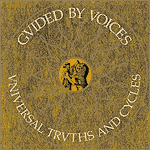|
|
|
|
|
| archive : A B C D E F G H I J K L M N O P Q R S T U V W X Y Z | ||||
|
| ||
 Guided by Voices
Guided by VoicesUniversal Truths and Cycles [Matador; 2002] Rating: 7.9 There was a time when Robert Pollard was on the verge of becoming an indie-rock Peter Pan-- with a beer gut. Though he was already well past the age of 98% of his audience by the time Bee Thousand was released, his music carried with it a kind of child-like enthusiasm and appreciation that set it apart from the pack of whiny 'alternative' rockers. It's easy to imagine Pollard, way back in 1993, sitting in front of his four-track, staring with determination at the cover of Who's Next and thinking to himself, "One day, I'll be able to use a real recording studio-- then I can be a real rock star!" Four brilliant albums and countless excellent EPs later, Bob Pollard finally got to live out his rock star dream. With TVT (Sevendust, anyone?) and herr jackass Ric Ocasek in his corner, Pollard finally had the resources at his disposal to make a shot at the big leagues. Unfortunately, it seems that Pollard was too busy with his shiny new toys to actually figure out something to do with them. Thus, Do the Collapse, the last album by Pollard the man-child, bore all of the whimsy of his earlier works with none of the substance. It's hard to imagine an experience more sobering (figuratively, at least) than your big break doing little more than pissing off the people who were sticking up for you way back when. And to top it all off, Pollard went and pulled a Howard Stern, as domestic turmoil cast a more sinister light on his once-charming hedonism. Isolation Drills, though a more solid effort than its predecessor, marked the end of the child-like charm that Pollard had sprinkled throughout his earlier work. Effortless hooks and fantastical storytelling gave way to chugging riffs and darker lyrics. This new direction went over with a mainstream audience about as well as all of the band's older directions did, and Guided by Voices quickly found themselves off the label, before being scooped back up by their former boosters at Matador. Which brings us to Universal Truths and Cycles. To make a long story short, it's the best thing Pollard's done since Mag Earwhig!. And while it doesn't recapture the magic of the Sprout-era Guided by Voices records, Universal Truths and Cycles marks the return of some of the most sorely missed qualities of early Guided by Voices: strong vocal melodies and refreshingly atypical song structures. The album's 35-second opener, "Wire Greyhounds," provides a brief high that's far too quickly brought down by "Skin Parade," a song that relies on a jarring, barely interesting riff to take up the space surrounding the memorable chorus. After this brief misstep, though, the album genuinely takes off, with the brief acoustic number "Zap" setting the stage for the album's two greatest songs. "Christian Animation Torch Carriers" begins with a bit of melancholy, as Pollard harmonizes with himself over a simple yet compelling chord progression. The band enters, building towards a thrilling climax that utilizes some of Pollard's most tried and trusted songwriting techniques. The result is one of those inimitable moments where it sounds like Pollard, while sliding an open chord up and down the neck of his guitar, happened to stumble upon a perfect song. While "Christian Animation Torch Carriers" does sometimes meander as it builds towards its explosive ending, "Cheyenne" wastes no time making its brilliance known. Built around a lovely chord progression and developing towards an endlessly catchy finale, "Cheyenne" could easily be the most blissful Guided by Voices song since Waved Out's "Subspace Biographies." Aside from "Cheyenne," there aren't any other tracks on Universal Truths and Cycles that unquestionably qualify as classics. "Back to the Lake" comes close, perfectly contrasting its rhythmically relentless drive with a simple, laid-back vocal melody. The slightly overlong "Car Language" marries Joy Division darkness with Sonic Youth guitar lines, reaching a great instrumental section with rapid-fire drums and squalling feedback. Yet, other songs, like the minute-long "The Ids are Alright" and "Factory of Raw Essentials" meander in typical Pollard fashion without ever really registering. At this point, it's clear that the days when Bob Pollard could effortlessly create perfect pop songs are gone. There's blood and sweat all over these songs-- even "Cheyenne," this album's standout, contains a few moments of awkwardness, as Pollard chokes the song's melody with too many syllables. Still, Universal Truths and Cycles has more than its share of wonderful moments-- moments when the rock crunch of Isolation Drills blends seamlessly with the steady melodic sensibility of Under the Bushes, Under the Stars and the charming eccentricity of Bee Thousand. So, Robert Pollard has grown up. The question now is whether his newfound maturity will be able to replace the ambition and vivacity that came with his perpetual youth. Whatever hopes he might have had of bringing his sweet rock and roll to the masses have been crushed, trampled, and stomped into the ground. Thankfully, Universal Truths and Cycles suggests that Pollard may still have a few choice treats for those of us who are still paying attention. -Matt LeMay, June 24th, 2002
|
||





